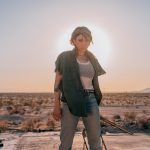Peter Case Live at McCabe’s
PETER RETURNS
WITH A CASE OF THE BLUES
By Terry Roland
(originally published in FolkWorks)
Peter Case , fully recovered from open heart surgery, begins a U.S. tour with a solo performance at Claremont’s Folk Music Center this Saturday, June 26, followed by an already sold-out show(a second show has been added) at McCabe’s on July 9th. His new record, Wig, on Yep Roc Records will hit the streets on June 29th.
In his first interview since his surgery in 2009 Peter Case talked with a sense of urgency and irony. He talked like a man aware of the precious nature of his own life. He learned his lessons well as a street singer in San Francisco during the 1970s: When in doubt, when the pressure comes on, get back to basics. Lean on the streets. Who says you can’t go home? If his hometown is a fresh and raw blues-rock Peter Case has done so with a vengeance with this new record. Recorded in three days live in the studio with guitarist and songwriter Ron Franklin and X drummer, DJ Bonebrake, there were no computers in sight and only minimal overdubs. At times it harkens back to the spirit of Dylan’s classic Highway 61 Revisited. In the following interview, Peter talks about the making of the record, his life after surgery and his desire, as he said, ‘to just keep rockin.’ And after all, that’s what he’s always done best.
TERRY: How’s your health?
PETER: It’s going good. It was a kind of a surprise. I was out of action. It took a while to get up to speed. I was really out of it. I couldn’t go on the road, nothing. Fortunately, this record company (Yep Rock) took my old recordings and I re-mastered and prepared them for release. Some of it goes back to ‘76, ya know, The Nerves and then some Plimsouls. It was a surprise for me. They’re really rockin’ records.
TERRY: How did going back like that affect you?
PETER: It turned me on. Got my energy going. It woke me up. I had to get it down, get back to making records. So this new record was made. I produced it. It came natural. A few years ago I was working with these guys, DJ Bronebake and Ron Franklin. We were working on the same record. We enjoyed playing together. It was easy to do. You know, I played guitar, Ron played guitar. We got this thing locked in; this Keith Richards and Brian Jones mesh of two guitars. We’d play together and then hang out and start writing songs. We went into the studio in December. We recorded most of the album in one day.
TERRY: You recorded it live?
PETER: Yeah, it’s live. Just two guitars and drums. I went back and added the bass. We recorded it on two inch tape.
TERRYP: It was all analog?
PETER: Yeah. No digital, no added echo. We were in the visual realm. We captured something thick and real. A lot of it was early takes, or things we came up with in the studio on the spot.
TERRY: There’s a feeling like Chess and Muddy Waters on this record. Like the first time I heard Fresh Cream.
PETER: Yeah, that’s good. That’s one of my favorite records. You know like Cat’s Squirrel. We got this Rollin & Tumblin feel. Chess records was the inspiration.
TERRY: How did you come to love this music?
PETER: In my family, there was a sixteen year span with the kids and I was the youngest. I inherited the singles collection. So, when I was a little kid, I was listening to Chuck Berry and Link Wray, you know, blues. I mean, it’s rock and roll, but basically it’s blues.
TERRY: On Wig, did your approach to songwriting change?
PETER: I really didn’t change much about my writing. I just reached a point where I’m thinking, ‘I gotta rock and roll.’ It’s mostly all original. We cover one Leadbelly song. The rest is new. We went into the studio and just hoped for the best. I had no idea how it was going to go down. But, I just revved up.
TERRY: Will you be touring with the band?
PETER: Yeah. I’ll kick it off in Claremont solo. The band will play with me at McCabe’s. In Claremont I’ll play acoustic some and electric too.
TERRY: How were these songs written? Acoustic or electric?
PETER: Both. I’d work on a riff on electric and then transfer it over to acoustic. It was fun to play on this old acoustic. It was this Gibson. It has this buzz, kind of a Robert Johnson thing.
TERRY: Did you write them while on guitar or just in your head.
PETER: I had the songs in my head for quite a while. Sometimes I didn’t even know it. They’d just come out when we’d plug in to play electric. A lot of it happened in the studio as we recorded. It took shape there. Then, I’d write something and Ron would change it around, change a few lyrics. There was this visceral feel to it. It’s kind of weird how songs take shape. You just try not to force it.
TERRY: For a while you were doing songwriting workshops.
PETER: Yeah, you can’t teach songwriting. All you can do is help them along, start the fire. It turns out there’s no one set way. Songs come in all different ways. There was one song, Somebody Told The Truth, from 2005. We recorded it then Duane Jarvis died. It was a really heavy period. The weird thing is the song sounds like it was written about Duane. Something about that woke me up.
TERRY: How did you hit this fresh raw sound in such a short time with minimal production?
PETER: Well, you could go in and make a super-layered record. You know, people get really intense. You know some great records have been made that way. But a lot of time, they’ll spend two and half years and it comes out like a bad movie. I learned something from Chess Records. How they did it. They didn’t force things. They just experienced the music. That’s what we did. We had no idea. You know, it’s not like years ago when you had a big budget. We went in with no money. We probably made it on less than a thousand dollars. You don’t really need that big budget.
TERRY: Like the stories about the spontaneous recording of Elvis’ That’s Alright Mama.
PETER: Yeah. You know, I was born the day that was recorded.
TERRY: So, you’ve had a published book?
PETER: Yeah. I had a book published a while ago. I want to do more. I’ve been working on one. It’s gonna be pretty big book. Right now I’m at just before The Nerves in 1974.
TERRY: Are you trying for a Dylan Chronicles kind of thing?
PETER: No. I mean, he’s Bob Dylan. He was writing about everything, the times, the period. No mine’s kind of an anti-Chronicles. Dylan and I went like opposite directions. He went to the east and made it to the top and I went west and made it to the bottom. (Laughs) You know, I was about life on the streets then.
TERRY: What changed for you after the surgery, I mean, perspective?
PETER: Man, I don’t want to bum people out with this, but there is this sense of life and death. It’s real. An awareness. I mean I’ve had it really since I was a kid. But, then you go and you forget about it. Then, one day, I have heart surgery and it’s a reminder. I mean, they were saying I was on the verge of a massive heart attack. You go into the surgery and the light goes out, then you wake up and it’s there again. There’s this sense of being alive. It really hit me. It made me question things. You know, I took this break in my life. I couldn’t go on the road. Before there was this feeling of go, go, go, keep going. You know I had to go to keep my life moving to pay bills and all that. I was like the Stone’s song, Beast of Burden. But, who isn’t a beast of burden? Then, there came this thing where I just wanted to rock and roll. I mean, we rock and roll because we can. It really made me appreciate life and on the other hand I realized we don’t really have control .I had to trust that everything was going to work out. Before the surgery I had this weird feeling. I saw the dawn coming up in the east over L.A. It was like I was seeing it for the first time. Like when I was kid in San Francisco. Then, I spent time reading William Blake.
After, I just got this feeling like we’re gonna die…so let’s do some rocking. Be in the moment. I’ll tell you what it was like. The world was beautiful. It was like I was on this huge precipice seeing the sunrise across L.A. Everything was very beautiful. And I was on this huge cliff ready to fall, but I enjoyed the beauty of it. That’s what it’s about, man.
——————————————————————————–
Terry Roland is an English teacher, freelance writer, occasional poet, songwriter and folk and country enthusiast. The music has been in his blood since being raised in Texas. He came to California where he was taught to say ‘dude’ at an early age.




